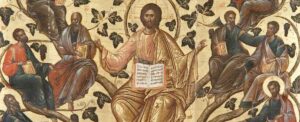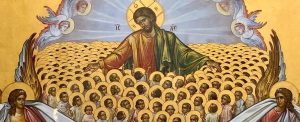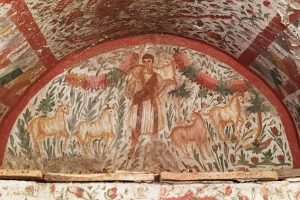The wise thief didst thou make worthy of Paradise in a single moment, O Lord. By the wood of thy cross illumine me as well, and save me.
(Exapostilarion, Holy Friday Matins)

Icon of the Repentant Thief, from the Ikonenmuseum in Kampen, Overijssel, Netherlands
On the scroll in his right hand is the Troparion of the Ninth Hour of Great Friday:
When the thief beheld the Author of life hanging upon the cross, he said: “If it were not God incarnate that is crucified with us, the sun would not have hid its rays nor would the earth have quaked and trembled. But, all-forbearing Lord, remember me in thy Kingdom.”
Who is the wise thief? Saint Luke calls him a malefactor (kakourgos, an evildoer):
And there were also two others, malefactors, led with him to be put to death. And when they had come to the place called Calvary, there they crucified him, and the malefactors, one on the right hand, and the other on the left. Then one of the malefactors who were hanged blasphemed him, saying, “If you are the Christ, save yourself and us.” But the other, answering, rebuked him, saying, “Do you not even fear God, seeing you are under the same condemnation? And we indeed justly, for we receive the due reward of our deeds; but this man has done nothing wrong.” Then he said to Jesus, “Lord, remember me when you come into your kingdom.” And Jesus said to him, “Assuredly, I say to you, today you will be with me in Paradise.” (Luke 23:32-33, 39-43).
Saints Matthew (27:38) and Mark (15:27) call this man a “thief” (lestas), which in the writings of the Jewish historian Josephus is the term used for Jewish rebels against Rome, who likely had robbery as part of their anti-Roman activities. In John 18:40, the Barabbas who was released in place of Christ is again called a lestēs. For this reason some modern English translations choose to call all these men rebels.
It is not surprising that, of the four Evangelists, it is Saint Luke who tells us about the thief’s repentance. Luke begins his Gospel,
Inasmuch as many have taken in hand to set in order a narrative of those things which have been fulfilled among us, just as those who from the beginning were eyewitnesses and ministers of the word delivered them to us, it seemed good to me also, having had perfect understanding of all things from the very first, to write to you an orderly account (Luke 1:1-3).
Luke includes many details not found in the other Gospels, such as the meeting on the Emmaus road (24:13-35), which tradition tells us happened to Luke himself and Cleopas. The parables of the Good Samaritan (10:25-37) and the Prodigal Son (15:11-32), and the Lord’s weeping over Jerusalem (Luke 19:41-44), and the Lord’s healing the ear of Malchus after Peter cut it off (Luke 22:50-51; cf. John 18:10).
Of special interest are Luke’s accounts of the conception of the Forerunner (1:5-25), the Annunciation to the Mother of God and her visit to her cousin Elizabeth (1:26-56), the adoration of the shepherds (2:8-20), and the Lord’s childhood teaching in the temple (2:41-52). Luke diligently sought firsthand accounts from eyewitnesses among the Twelve, but many of these details he clearly had directly from the Mother of God herself, who alone experienced them.
And it was certainly from Mary and the women who never left the foot of the cross (John 19:25-27) that Luke learned of the repentance of the thief on the cross, which only his Gospel recounts.
The wise thief is not named in scripture, but in the Gospel of Nicodemus, he is called Dysmas or Dismas.
Then Pilate commanded the veil to be drawn before the judgement seat whereon he sat, and said to Jesus: Your nation has convicted you as being a king: therefore have I decreed that you should first be scourged according to the law of the pious emperors, and thereafter hanged on the cross in the garden where you were taken: and let Dysmas and Gestas the two malefactors be crucified with you…
And one of the malefactors that were hanged spoke to him, saying: If you are the Christ, save yourself, and us. But Dysmas answering rebuked him, saying: Do you not at all fear God, seeing you are in the same condemnation? And we indeed justly, for we receive the due reward of our deeds; but this man has done nothing wrong. And he said to Jesus: Remember me, Lord, in your kingdom. And Jesus said to him: Truly, truly I say to you that today you shall be with me in Paradise.
This text, also called the Acts of Pilate, existed in an early form in the time of Justin Martyr, who refers to it in his First Apology (c. 155 AD). Western Christians will be familiar with the name Saint Dismas (and perhaps the US city of San Dimas, California, named in his honor.)
Interestingly, in the Russian iconographic tradition this man is known by the unique name Rakh (Рах). This name may be surprising, as it has no connection outside Russian iconography. But Thomas Daiber suggests that it may come from the title of a particular icon named “The Wise/Prudent Thief in Paradise,” written in Cyrillic as Благоразумны Разбойник В Раю: Blagorazumnuiy Razboinik V Raiu. If an icon painter copied a damaged icon, then he may have guessed at the unclear letters so theat Разбойник В Раю became Разбойник Рах.
The Wise Thief has never needed to be formally glorified by the Church as a saint, since he – alone in scripture – is explicitly said by Christ to be “with me in Paradise.”
By his prayers, O Lord Jesus Christ, have mercy on us and grant us his faith.






